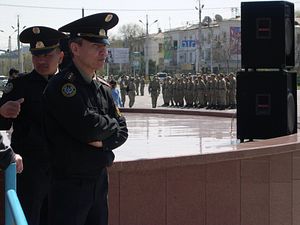It’s only September, but it’s clear that 2016 has brought the greatest string of domestic terror threats Kazakhstan has seen in at least five years. While details on the June attack in Aktobe remain scant, Kazakhstani authorities have begun detailing other plots apparently foiled throughout the year.
Earlier this week, the National Security Committee, or KNB, released a statement on disrupted plans to target a series of installations throughout Kazakhstan, including, most notably, a Russian military unit near the city of Balkhash. Other plans, which the KNB claimed involved coordination with Kazakh militants abroad, intended to unleash attacks in Moscow and Kazakhstan reminiscent of the Paris shootings last November. Individuals detained also reportedly considered hijacking airplanes for an attack “similar to the attacks of Sept. 11, 2001, in the United States.”
All told, the KNB detailed eight separate Islamist groups — some of which included citizens from Kyrgyzstan — disrupted and arrested in 2016 alone. The lengthy statement came as a court in Aktobe jailed Almas Abdiraev for calling for terrorist attacks in Russia “as a response to Russia’s military operations in Syria,” RFE/RL reported.
In addition to the magnitude of the plots — 2016 has arguably brought the greatest domestic terror threats Kazakhstan has known during any point in its quarter-century of independence — there’s another, potentially more disconcerting trend within the recent plots and sentencings. Where the prior terror attacks had clearly targeted domestic installations, the inclusion both of Moscow’s military units and potential plans in Russia proper point to a new, external focus within Kazakhstan’s terror threats. Suddenly, Kazakhstan’s concerns about terror are no longer purely internal — and Moscow’s concerns about domestic stability, and threats, along its Kazakhstani border carry a bit more justification.
Whether this portends any shift in relations between Astana and Moscow, only time will tell. However, it will add one more ingredient, one more bit of rationale, for any potential Russian interference in Kazakhstan in the years ahead. Considering we’ve just passed the two year anniversary of Russian President Vladimir Putin obliquely questioning the notion of ethnic Kazakh statehood — and considering Kazakhstan’s large, and restive, ethnic Russian population — any excuse for Russian interventionism is one that will send chills through Astana, and will add one more layer of questions as the fallout from these plots unfurls.

































